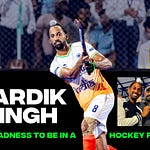Mark Hager was the guest of our podcast today. Mark is the current head coach of the Australian men’s team, affectionately known as the Kookaburras, and a legendary former striker and captain for Australia, who led his team to a bronze medal at the 1996 Atlanta Olympics. Over the course of a decades-spanning career, Mark has not only competed at the sport’s highest levels but has also shaped teams worldwide with his coaching prowess. Prior to his current role, Mark steered the New Zealand and Great Britain women’s teams to remarkable heights—including an Olympic bronze with GB at Tokyo 2020.
Ernst opens the conversation by asking Mark where he is as the interview takes place. Mark offers a personal glimpse into his life away from the pitch, explaining that he’s joining from Dunsborough, a peaceful beach town a couple of hours outside Perth. As he puts it, Dunsborough is his “home away from home,” a place to both reflect and disconnect from the relentless world of high-performance hockey. This setting sets a tone for the episode, highlighting the humanity and balance Mark tries to bring to his career and personal life.
Transitioning from Women’s to Men’s Hockey
Jaspreet starts the hockey discussion by delving into Mark’s recent transition, from decades coaching women’s international teams to heading the men’s Kookaburras. Mark is candid about the unique challenges involved. He notes that while many structural aspects remain similar between men’s and women’s hockey, the men’s game features more one-on-one duels and relies heavily on aerial balls to break down defenses. “In the men’s game I find it’s a little bit more man to man...the aerial ball is very productive,” Mark observes, hinting at the constant tactical adaptations a top-level coach must make. Yet, Mark embraces these differences, saying, “It’s been the biggest challenge for me this year…now I feel I’m in a good position to understand the men’s game a lot more.”
Coaching the Next Generation: Then vs. Now
Ernst probes how Mark’s approach to coaching young athletes has evolved through the generations. Mark reflects on the drastic changes:
“When I first came through as a coach or a player, it was very much: do as you’re told, get out there, run hard.”
But today’s athletes seek understanding and want to be part of the process. Video analysis plays a far greater role, and the focus is more on encouragement and highlighting players’ strengths.
“We still talk about the development areas, but focus more on their strengths and what they bring to the team,” he explains.
This shift towards empathy and athlete empowerment marks a significant evolution in coaching philosophy.
Adapting to Change: Is Empathy Inherent or Learned?
Following up, Ernst asks whether this new approach comes naturally to Mark, or if it has required a conscious effort to change. Mark admits this evolution didn’t come easily. “Definitely, no, it’s definitely been a challenge,” he says, recalling his early coaching days with New Zealand where he leaned heavily on hard-edged direction. “When I went to Great Britain, I had to adapt,” Mark adds.
The presence of strong assistant coaches in GB helped him step back and adopt more of a “relationship coach” style. He shared, “It also helped because I had two really good assistant coaches…so I could step back and become more of a, I suppose, a relationship coach. So I could get to know the players more, give them more empathy.” The support of a broader coaching staff allowed him to avoid always being the ‘bad guy,’ and offered a more holistic means of supporting his athletes.
Returning to Australia: Was Head Coach Always the Plan?
Shifting gears, Jaspreet inquires whether becoming head coach of the Kookaburras was always in Mark’s plans upon his return to Australia in 2021. Mark responds with humility, saying he didn’t anticipate jumping back into such a high-profile job so soon, instead prioritizing family after years abroad. “I hadn’t seen my family for three years so I really wanted to spend time with them,” he confides. When the coaching role opened up, supportive words from his wife reignited his ambitions, but Mark felt more balanced and at peace with whichever way the process played out. Now, he finds satisfaction in blending his experiences from Great Britain and New Zealand into his work with Australia, highlighting the value of empathy and consultation:
“Don’t be afraid to admit if I don’t know anything or if I’m not sure, you know, ask the players.”
First Lessons with the Kookaburras: The Pro League Experience
Ernst draws attention to Mark’s first major stint with the Australian men—Pro League games marked by both triumph and learning curves. Due to player commitments in the Indian Hockey League, Mark was ‘forced’ to field several debutants. Instead of a setback, he calls it a “fantastic opportunity for those young players,” appreciating their fearless and unencumbered approach to the game. “Some of those performances…really opened my eyes about how youth can really excite a team.” Mark acknowledges that, without this circumstance, he may have defaulted only to senior players, and this experiment has positively influenced his squad-building philosophy.
The Future of the Debutants: World Cup Hopes
Picking up the thread, Jaspreet questions whether any of these eight debutants have impressed Mark enough to be part of Australia’s World Cup squad. Mark is optimistic yet measured in his response. “There’s a little bit of hockey to go yet,” he says, citing the upcoming Indian League and the Pro League as continued proving grounds. He strikes a balance between development and letting players express themselves, wishing to avoid over-coaching:
“We really want them to play with flair and give them a lot of freedom and I think that’s worked really well for a lot of our young players this year.”
Oceania Cup: Should Asia and Oceania Merge for Hockey?
After Australia’s recent Oceania Cup win, Ernst floats a provocative idea: merging the Oceania and Asia Cups for increased competition. Mark is receptive, recalling the positive experience as a junior playing in hybrid Asia-Oceania qualifiers, and praises the diversity and level of challenge such events brought: “It was a great, it was a fantastic tournament, a really good tournament.” However, he’s realistic about the current lack of multi-team tournaments, and the removal of the Commonwealth Games highlights this challenge further:
“We have to try and find tournaments because we don’t play tournaments now…if we don’t join with Asia, then Oceania and Asia have got to start playing tournaments against each other anyway.”
Should the Champions Trophy Return?
Jaspreet laments the lack of regular multi-nation tournaments, asking Mark if the famed Champions Trophy should return. There’s a wave of nostalgia, with Mark and Ernst both fondly recalling the tournament’s prestige and excitement. “I loved it. We all did,” Mark affirms, while noting that financial difficulties make such competitions challenging. He’s pragmatic: “The Pro League has its plus and minuses. It gets hockey around the world...but, oh look, yeah, I loved playing the Champions Trophy.” Still, Mark expresses hope for a revival of similar tournament formats, noting the invaluable experience they offer.
Coaching: Europe vs the countries from Down Under
Jaspreet asks Mark what differences he experienced coaching a European team compared to Australian or New Zealand squads. Mark downplays drastic differences, emphasizing the universality of his coaching philosophy: “I try and impose my style...attacking, aggressive hockey.” He appreciates that Great Britain and England were receptive to attacking play, and though some early results were tough, he stuck to his guns and challenged his team to bolster their defense to match their offensive flair.
Hockey Australia’s Pathway Program: Insights and Value
Ernst notes that Mark, during his supposed ‘break’ from international coaching, was serving as tactical lead for Hockey Australia’s pathways program. Mark explains this gave him much-needed insight into how Australian hockey now operates and allowed him to work closely with figures like Mark Knowles. “…he had the enthusiasm, the youngness...had different ideas how the men were playing. We could talk about the players who were coming through, what skills we wanted to develop.” He highlights the program’s role in monitoring youth development and the promising talent pipeline emerging in Australia, referencing a quote:
“When you lose, it’s learning. It’s not losing.”
Hockey One League: Australia’s Domestic Competition
Jaspreet turns to the Australia’s premier domestic competition—the Hockey One League—asking about its evolution and impact. Mark sees clear positives in the league’s growth and the move towards a franchise model, increasing opportunities for players to play for different clubs, and inviting overseas talent. But there’s a downside: a limited number of playing and travel spots each week means some promising juniors miss out on top-level game experience. “That would be the only downfall, I think, just the number of players that can play each weekend,” Mark asserts, but he is hopeful for ongoing improvements.
A Personal Anecdote: The Story of Mark’s Thumb
Adding a personal touch, Ernst recounts a quirky story he heard from Australian hockey circles: Mark is missing half a thumb. Mark confirms it’s true—but rather than a harrowing pitch accident, it happened in a factory when he was younger. With trademark humor, he says,
“I thought at the time that was the end of my hockey career, but…I was fortunate. It was above my knuckle so I could still hold a hockey stick… I saw it as an advantage because it couldn’t get hit.”
Planning for the 2026 World Cup
As the conversation draws towards the future, Jaspreet focuses on the upcoming 2026 Men’s World Cup. Australia’s missed podium finish in 2023 was their first such in over two decades. Mark acknowledges the challenge ahead, emphasizing a dual focus on developing the young squad’s international experience and fostering a culture of belief and resilience: “We also…have a training block next year from pretty much from start of January up to the World Cup where most of us are based in Perth…That’s a real advantage for our program.” Psychologically, he wants to instill the lesson that a single bad day can derail a tournament, so scenario-based training and mental conditioning are key. His approach melds strategic preparation with an emphasis on maintaining Australia’s signature attacking, aggressive style: “We want to play our game…We don’t want to change that style.”
Parting Words and Reflections
The episode closes with a personal note, as the hosts check in on the health of Mark’s brother-in-law, fellow hockey coach Michael Nobbs, who played a role in arranging the interview. Mark shares that Michael is undergoing treatment but remains in good spirits, and the hosts extend their well wishes. In a lighter moment, they recall Michael’s daughter banning him from coaching her—reminding all coaches to let their kids simply enjoy being kids.
This episode of Studio Hockey offered a rich, multifaceted conversation with Mark Hager—a coach who embodies both tradition and transformation within the ever-evolving sport of field hockey. From tactical insights and generational shifts in coaching, to stories of resilience, ongoing challenges, and a clear-eyed vision for the future, Mark’s experience provides valuable lessons for hockey enthusiasts around the globe.
We hope you enjoyed this episode of Studio Hockey, a podcast about international and domestic field hockey. As always, your co-hosts Ernst Baart (bringing the European perspective) and Jaspreet Singh (offering the Asian viewpoint) are here to ensure the global game gets the diverse attention it deserves.
Subscribe to stay tuned, and until next time—happy hockey, everybody!














